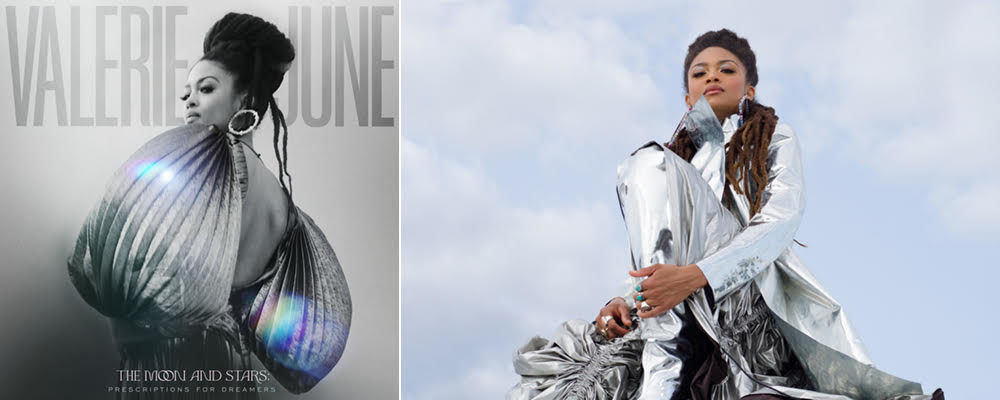Valerie June Takes Listeners on a Spiritual Odyssey With ‘The Moon and Stars: Prescriptions for Dreamers’
Todd Gilchrist
If she hadn’t “broken through” critically back in 2013 with her fourth album “Pushin’ Against a Stone,” it’s hard to say if Valerie June would be more or less poised for success now as she delivers “The Moon and Stars: Prescriptions for Dreamers,” a collection of songs simultaneously wildly out of step with current trends and yet that hit that “buzzworthy” bullseye precisely because of its anti-commercial eclecticism. Eight years ago, “Pushin’” earned a spot in Rolling Stone’s Top Ten Albums of the Year; in 2017, its follow-up “The Order of Time” cracked the publication’s year-end top 25. Her slow and steady climb continues with “The Moon and Stars,” an adventuresome combination of psychedelia and bluegrass, spiritual jazz and classic soul whose meandering, philosophical core defies genre and challenges the listener.
Like some of the black female singers who came before her, similarly attracting acclaim for straying from more traditional musical paths — India Arie, Alicia Keys, Kandace Springs, Esperanza Spalding — June’s talent overlaps with forebears and luminaries while still forging an original path. From the opener “Stay,” June’s music is rooted in the blues, with numerous other traditions mixed in as she explores love, life and enlightenment, singing, “So if you can believe it / Since the day we first met / I’ve had not one regret / Darling, don’t you forget.” Following a brief instrumental interlude, “You And I” begins solely with vocal harmonies, an intimate, soul-warming spiritual that expands to feature two drummers and two guitarists as it encompasses her musical vision.
Rather than reiterating the conventional binary of love found or lost, she sorts through a romance that evolved into a different, more meaningful relationship: “When the love left just a friendship / That’s when we found our greatest gift.” You get the sense that she’s yearning, exploring the optimistic possibilities of her experiences, even when they conclude in more conventional “failures.”
Her voice sounds like a wirier, more idiosyncratic version of Erykah Badu’s, which itself updated and borrowed from Billie Holiday; one isn’t better than the next (or the former), but where her two predecessors put more honey on their delivery, June sounds the least polished, which sometimes tests the melodicism of her thoughtful compositions. “Colors,” for example, weaves a mystical voyage through June’s past (“And I count my wrongs and multiply them / By the rights to justify just what I feel”), and the chorus vacillates between plainspoken, almost bracingly earnest and reedy, almost anemic. Conversely, “Stardust Scattering” feels more ethereal, similar to something by jazz artist Angel Bat Dawid, as she slowly wades through some simple, oft-unspoken truths (“Ain’t it funny how the ones / Make us laugh can know such pain”), and eventually her own consciousness: “Merrily life is but a dream / Consciousness directs the stream / There’s a flow to everything.”
June creates a bit of a centerpiece around “Call Me A Fool,” a song on which she partners with Carla Thomas, belting about love over a simmering organ that would do Otis Redding proud, and with an occasionally shocking abandon that matches the wonderful, joyful uncertainty of the lyrics (“I’ll be a fool any time, any time for loving you”). The comedown of “Fallin’” offers a slight disappointment as she sings like she’s making up the central melody as she goes along; the song serves as a sort of lynchpin for your potential enjoyment of her music as a whole, especially since it tests how unpolished she can sound before the listener revolts. But “Smile” settles into a comfortable, uplifting groove, sounding like a great Funk Brothers-era Motown instrumental whose timeless she anoints with her singularly philosophical point of view. Then, shockingly, she uses trap drums and goes in another totally different direction, evoking the likes of Georgia Anne Muldrow, and proving that even if you don’t like everything she has to offer, she contains more than enough multitudes to make up for it elsewhere.
Building to the introspective, inspirational ballads “Two Roads,” June truly hits her musical stride with a track that again recalls artists like Otis — seemingly alone in the studio except for the devastating, palpable emotion conveyed in her voice. Here, she’s simply reminding the listener of the choices they face, and must come to terms with, every time they engage with the world (“Might get a strange feeling / Something’s been overlooked / But every journey forward / Two roads, two roads, one you took”). “Home Inside” winds the album down with a centered vision of life, and a way of looking at the world: “I know there is a place for me / Help me to grow that I may leaving see.” Never preachy, June is merely being optimistic and encouraging; and whether that sort of spirituality is something you enjoy listening to or maybe desperately need to hear, “The Moon and Stars: Prescriptions for Dreamers” offers a welcome, feel-good alternative to what else is out right now, testing musical boundaries while letting us know about infinite spiritual possibilities.
“The Moon and Stars: Prescriptions for Dreamers” releases March 12 on Apple Music.

